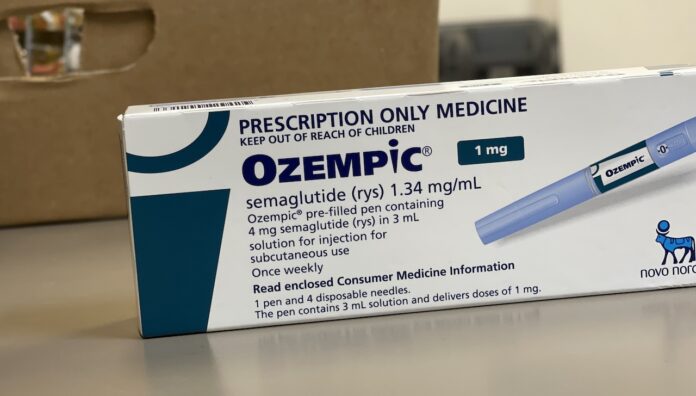Glucagon-like peptide 1 (GLP-1) agonists, traditionally used to manage type 2 diabetes, have been increasingly prescribed off-label for weight loss.
There are four GLP-1 agonist medicines approved by the Therapeutic Goods Administration (TGA) for use in Australia for the management of Type 2 Diabetes:
- dulaglutide (Trulicity)
- semaglutide (Ozempic)
- tirzepatide (Mounjaro)
- liraglutide (Saxenda).
There are only two GLP-1 agonists that are TGA approved for weight loss, semaglutide (Wegovy brand) and liraglutide (Saxenda).
With Christmas just around the corner – leaving budgets tight and GP access slim, coupled with substantial, persistent stock shortages – patients may find treatment abruptly interrupted.
PSA GP Pharmacist Anouska Feszczur MPS has helped several patients navigate through their reported GLP-1 agonist cessation symptoms.
Here are her top tips.
Prepare for a ravenous appetite and a return of impulsive behaviours
When patients stop GLP-1 agonists, the most significant cessation symptom is an increased appetite far exceeding pre-treatment levels, said Ms Feszczur.

‘Patients have told me cravings and appetite return with an insatiable force they’ve never experienced before,’ she said. ‘They also experience cravings for foods they had zero interest in while taking a GLP-1 agonist.’
The hunger and cravings tend to be extreme upon cessation, evening out over the space of weeks or months, said Ms Feszczur. This cessation symptom leads to another common post-treatment effect: weight gain.
‘Evidence shows stopping semaglutide leads to weight gain,’ said Ms Feszczur. ‘In one study, all participants put on two thirds of their weight back on in a year.’
Because patients often gain back the weight they lost post-treatment, other health benefits similarly erode.
‘For example, if a patient’s blood pressure or blood sugar levels improve during treatment with a GLP-1 agonist, they can go back to where they were when they stop,’ she said.
Mood can also be impacted upon GLP-1 agonist cessation. ‘Patients who felt proud of themselves for losing weight can experience guilt, shame and despair,’ said Ms Feszczur. ’They’ve spent all this money on treatment, and suddenly the weight has come back on.’
Lastly, some patients have mentioned an impact on impulsive behaviours when the dopamine regulation effects of GLP-1 agonists appear to wear off.
‘Almost all patients have said they drink less alcohol because they just don’t get the same buzz, and one patient even stopped chewing their nails,’ she said. ‘Some people have also indicated in forums that online shopping and gambling behaviour changed while they were on Ozempic.’
Those impulsive behaviours can return upon cessation, said Ms Feszczur – rendering the holiday period, where people tend to overeat, drink and spend, a tricky time to go off these medicines.
‘It could be quite distressing for patients who feel they have no control over impulsive behaviours.’
Encourage tapering and identify movement barriers
When patients cease GLP-1 agonists, optimising medicines for comorbid health conditions could be beneficial, said Ms Feszczur.
‘[Find out] if there’s anything they’re taking, or not taking, that might be a barrier to movement. For example, with pain management.’
Other services can help patients work through their movement challenges. ‘I’ve referred a patient with arthritis who ceased semaglutide to painHEALTH, a self-directed learning module on pacing which is all about trying to increase movement while still in pain,’ she said.
Ms Feszczur also suggests patients taper from GLP-1 agonists rather than immediate cessation.
‘GLP-1 agonists mimic a hormone. Any other medicine we give patients that mimic hormones, such as steroids, are tapered so the body can start making its own hormones again,’ she said.
‘If I know a patient is running out of Ozempic, and there’s no stock anywhere, I’ll advise a plan to reduce it gradually, which also empowers patients to mindfully go into cessation.’
Eat the right food and seek help for mood changes
To help reduce an insatiable appetite, pharmacists should recommend patients eat nutrient-rich food with low-calorie density.
‘Suggest eating protein with every meal and water-filled foods that make you feel fuller, such as watermelon, grapes and apples,’ said Ms Feszczur.
Patients should also avoid foods that don’t make them feel full. ‘For example if a patient loves chocolate but it doesn’t fill them up, advise them to swap it for low-calorie ice cream.’
Tools such as a food tracker app might also help patients regain a sense of control as they see their intake coming down.
Importantly, patients should be advised to be on the lookout for any mood or behavioural changes.
‘You could say to patients, “If you see impulsive behaviours increase, it’s important that you try to go to the GP – even though it’s a busy period”,’ said Ms Feszczur.
If GP access is difficult over the Christmas period, there are various helplines patients can access, including:
- National Alcohol and Other Drug Hotline
- Department of Social Services’ Gambling Support
- Turning Point.
Ongoing support is required
GLP-1 agonist cessation provides a good opportunity for pharmacists to promote a multidisciplinary approach to weight management, said Ms Feszczur.
Nutritional support could come from:
- a dietician
- GP
- formalised online nutrition programs such as Noom or MyFitnessPal.
‘A psychologist can also be useful to address some of the behaviours that may have led to overeating,’ she said. ‘Patients could be referred to their GP for a mental health treatment plan.’
Movement support is another area that should be considered. Pharmacists can ask:
- how are you finding movement?
- do you need help from an exercise physiologist to create a plan?
- are you happy to pay for a personal trainer?
Pharmacists should also encourage patients to make sleep a priority. ‘We know people who have good quality sleep have better luck maintaining their weight,’ said Ms Feszczur.
Sleep hygiene habits, as outlined by the Sleep Health Foundation here, can be discussed with patients. ‘There are also free Cognitive Behavioural Therapy for Insomnia (CBT-I) programs people can do at home to make sleep a priority.’
Report cessation effects to the TGA
Given GLP-1 agonist cessation is an emerging area, pharmacists should consider reporting any effects to the TGA, or encourage patients to self-report.
‘As the TGA says, “You don’t have to be certain, just suspicious”,’ said Ms Feszczur. ‘The only way we can build evidence is for people to say something.’
Setting expectations about cessation before patients start a GLP-1 agonist can also help them to prepare.
‘Pharmacists could say, “You might find it easy to lose weight while you’re on this medicine. But it’s important to make profound changes to your lifestyle, or most of the weight could come back on,’ she said.
Watch this space!
There is an emerging evidence base for using GLP-1 agonists to treat other conditions – including dementia and addiction, said Ms Feszczur.
‘My advice to pharmacists is to keep an eye out for new and emerging therapeutic areas for GLP-1 agonists, as well as any information you can find on cessation.’



 John Jones MPS, pharmacist immuniser and owner of My Community Pharmacy Shortland in Newcastle, NSW[/caption]
John Jones MPS, pharmacist immuniser and owner of My Community Pharmacy Shortland in Newcastle, NSW[/caption]


 Debbie Rigby FPS explaining how to correctly use different inhaler devices[/caption]
Debbie Rigby FPS explaining how to correctly use different inhaler devices[/caption]




 Professor Sepehr Shakib[/caption]
Professor Sepehr Shakib[/caption]

 Lee McLennan MPS[/caption]
Lee McLennan MPS[/caption]
 Dr Natalie Soulsby FPS, Adv Prac Pharm[/caption]
Dr Natalie Soulsby FPS, Adv Prac Pharm[/caption]
 Joanne Gross MPS[/caption]
Joanne Gross MPS[/caption]





